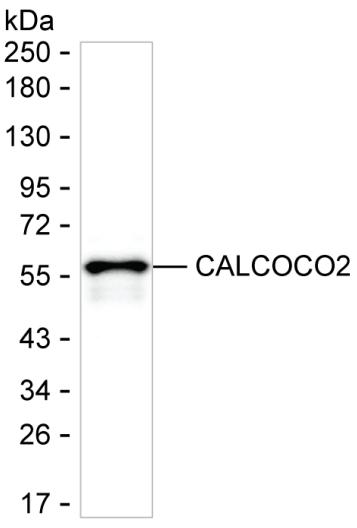
| WB | 咨询技术 | Human,Mouse,Rat |
| IF | 咨询技术 | Human,Mouse,Rat |
| IHC | 咨询技术 | Human,Mouse,Rat |
| ICC | 技术咨询 | Human,Mouse,Rat |
| FCM | 咨询技术 | Human,Mouse,Rat |
| Elisa | 咨询技术 | Human,Mouse,Rat |
| Host/Isotype | Mouse IgG2a |
| Antibody Type | Primary antibody |
| Storage | Store at 4°C short term. Aliquot and store at -20°C long term. Avoid freeze/thaw cycles. |
| Species Reactivity | Human |
| Immunogen | Purified recombinant fragment of human CALCOCO2 |
| Formulation | Purified antibody in PBS with 0.05% sodium azide |
+ +
以下是关于CALCOCO2(NDP52)抗体的3篇参考文献及其摘要概括:
---
1. **文献名称**:*NDP52 functions as a viral RNA sensor to initiate antiviral innate immunity through RIG-I*
**作者**:Liu B. et al.
**摘要**:该研究揭示了CALCOCO2/NDP52通过识别病毒RNA激活RIG-I信号通路,启动抗病毒天然免疫反应。研究使用CALCOCO2抗体进行免疫共沉淀实验,证实其与RIG-I的相互作用,并证明其在抗RNA病毒中的关键作用。
2. **文献名称**:*Mitochondrial autophagy receptors are essential for selective mitochondrial degradation by autophagy*
**作者**:Heo J.M. et al.
**摘要**:文章阐明了CALCOCO2作为线粒体自噬受体,通过结合泛素化线粒体蛋白招募自噬体。研究利用CALCOCO2抗体进行免疫荧光和Western blot,验证其在受损线粒体清除中的功能及与LC3的相互作用。
3. **文献名称**:*Structural basis for receptor-mediated selective autophagy of cytoplasmic aggregates*
**作者**:Turco E. et al.
**摘要**:该研究通过冷冻电镜解析了CALCOCO2与泛素链及自噬相关蛋白的复合物结构。CALCOCO2抗体被用于免疫印迹和细胞定位实验,证实其通过识别泛素化底物调控聚集体自噬的分子机制。
---
以上文献均聚焦CALCOCO2在自噬和免疫中的功能,抗体应用涵盖蛋白互作、定位及功能验证实验。如需扩展可进一步检索近年相关研究。
The CALCOCO2 (calcium-binding and coiled-coil domain-containing protein 2) antibody is a tool used to study the protein encoded by the *CALCOCO2* gene, also known as NDP52 (nuclear dot protein 52). CALCOCO2/NDP52 is a selective autophagy receptor involved in targeting intracellular pathogens, damaged organelles, and protein aggregates for degradation via autophagy. It plays a critical role in innate immunity by recognizing ubiquitin-coated cytosolic bacteria (e.g., *Salmonella*) and recruiting autophagic machinery to eliminate invaders. The protein contains multiple functional domains, including a SKICH domain for binding TBK1 kinase, a coiled-coil domain for oligomerization, and a ubiquitin-binding domain for substrate recognition.
Antibodies against CALCOCO2 are widely used in research to investigate its expression, localization, and interactions in cellular processes such as xenophagy, mitophagy, and immune signaling. These antibodies are essential in techniques like Western blotting, immunofluorescence, and immunoprecipitation to study its role in diseases like cancer, neurodegenerative disorders, and chronic infections. Dysregulation of CALCOCO2 has been linked to impaired autophagy in conditions such as Crohn’s disease and Parkinson’s disease. Researchers also utilize CALCOCO2 antibodies to explore its partnership with other autophagy receptors (e.g., p62. OPTN) and its regulatory cross-talk with inflammatory pathways, including NF-κB and interferon responses.
×